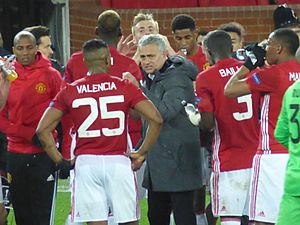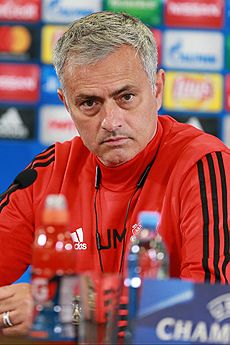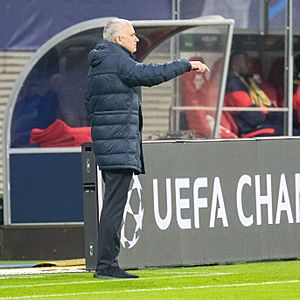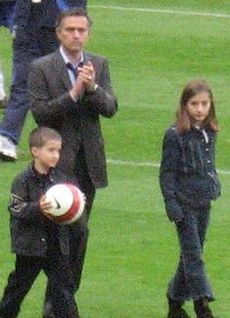José Mourinho facts for kids
Mourinho with Fenerbahçe in 2025
|
||||||||
| Personal information | ||||||||
|---|---|---|---|---|---|---|---|---|
| Full name | José Mário dos Santos Mourinho Félix | |||||||
| Date of birth | 26 January 1963 | |||||||
| Place of birth | Setúbal, Portugal | |||||||
| Height | 1.74 m (5 ft 8+1⁄2 in) | |||||||
| Position(s) | Midfielder | |||||||
| Team information | ||||||||
|
Current team
|
Fenerbahçe (head coach) | |||||||
| Youth career | ||||||||
| Belenenses | ||||||||
| Senior career* | ||||||||
| Years | Team | Apps | (Gls) | |||||
| 1980–1982 | Rio Ave | 0 | (0) | |||||
| 1982–1983 | Belenenses | 0 | (0) | |||||
| 1983–1985 | Sesimbra | 35 | (1) | |||||
| 1985–1987 | Comércio e Indústria | 27 | (8) | |||||
| Total | 62 | (9) | ||||||
| Managerial career | ||||||||
| 2000 | Benfica | |||||||
| 2001–2002 | União de Leiria | |||||||
| 2002–2004 | Porto | |||||||
| 2004–2007 | Chelsea | |||||||
| 2008–2010 | Inter Milan | |||||||
| 2010–2013 | Real Madrid | |||||||
| 2013–2015 | Chelsea | |||||||
| 2016–2018 | Manchester United | |||||||
| 2019–2021 | Tottenham Hotspur | |||||||
| 2021–2024 | Roma | |||||||
| 2024– | Fenerbahçe | |||||||
|
||||||||
| *Club domestic league appearances and goals | ||||||||
José Mário dos Santos Mourinho Félix (born 26 January 1963) is a Portuguese professional football manager and former player. He is currently the head coach of Süper Lig club Fenerbahçe. Many people consider him one of the greatest and most successful football managers of all time.
Mourinho has won league titles in four different countries. He is one of only a few managers to win the top European club competition, the UEFA Champions League, with two different teams. He is also the only manager to have won all three major European club competitions: the Champions League, the Europa League, and the Europa Conference League.
After a short career as a midfielder in Portugal, Mourinho stopped playing football at age 24. He then started coaching. He worked as an interpreter for manager Bobby Robson at Sporting CP and Porto. Later, he became a successful assistant coach at Barcelona under Robson and then Louis van Gaal.
After brief periods managing Benfica and União de Leiria, Mourinho returned to Porto in 2002. There, he won two Primeira Liga titles, the Taça de Portugal, the UEFA Cup, and the UEFA Champions League. This success led him to England, where he joined Chelsea in 2004. At his first press conference, he famously said, "I think I'm a special one," which led the media to call him "The Special One." With Chelsea, Mourinho won two Premier League titles, an FA Cup, and two League Cups in three seasons. He left in 2007 due to disagreements with the club owner.
In 2008, Mourinho moved to Italian club Inter Milan. He led them to the Serie A title in his first season. In 2010, he achieved a historic "treble" by winning Serie A, the Coppa Italia, and the UEFA Champions League. This was the first time an Italian club had won all three in one season. He became one of five coaches to win the European Cup with two clubs. Later that year, he was named the first-ever FIFA World Coach of the Year.
Mourinho then went to Real Madrid in Spain. He won the La Liga title in 2011–12, breaking several records for points, goals, and wins in a season. He also became the fifth coach to win league titles in four different countries. Mourinho left Real Madrid in 2013 and returned to Chelsea. He won another league title and League Cup but was dismissed in 2015 after a difficult period.
Mourinho became manager of Manchester United in 2016 and Tottenham Hotspur in 2019. Both periods ended with some challenges. However, he won the UEFA Europa League and a League Cup with Manchester United. He also led Tottenham to a League Cup final, though he was sacked just before it. From 2021 to 2024, he managed Roma, winning the first-ever UEFA Europa Conference League in his first season. This was Roma's first European title and their first trophy since 2008. It also made Mourinho the first manager to win a major European competition with four clubs, and the third to win all UEFA club competitions. He joined Turkish club Fenerbahçe in 2024.
In 2015, the Portuguese Football Federation named Mourinho the Portuguese Coach of the Century. People often compare him to Argentine manager Helenio Herrera because of his smart tactics, strong personality, and focus on winning.
Contents
- Early Life and Playing Career
- Starting His Coaching Journey
- Becoming a Manager
- Manager Profile
- Media and Public Life
- Personal Life
- Managerial Statistics
- Honours and Achievements
- See also
Early Life and Playing Career
José Mourinho was born in 1963 in Setúbal, Portugal. His father, Félix Mourinho, was a professional football player and even played once for the Portuguese national team. His mother was a primary school teacher.
Mourinho wanted to follow his father's path and joined the youth team at Belenenses. He later played for several smaller clubs in Portugal, including Rio Ave, Sesimbra, and Comércio e Indústria. He was even captain at Comércio e Indústria. However, he realized he wasn't fast or strong enough to be a top professional player. So, he decided to focus on becoming a football coach instead.
Education and Learning to Coach
Mourinho studied physical education at the Instituto Superior de Educação Física (ISEF). After finishing his studies, he took coaching courses in England and Scotland. During this time, former Scotland manager Andy Roxburgh noticed how driven and detail-oriented Mourinho was. Mourinho wanted to change how coaches worked in football, combining coaching ideas with ways to motivate players and understand their minds.
Starting His Coaching Journey
After working as a school teacher, Mourinho began his professional football coaching career. He started as a youth team coach at Vitória de Setúbal in the early 1990s. He then became an assistant manager at Estrela da Amadora and a scout at Ovarense.
In 1992, a big chance came up. Bobby Robson, a famous English coach, became the new manager of Sporting CP in Lisbon. Robson needed a local coach who spoke English to be his interpreter. Mourinho got the job.
As an interpreter, Mourinho started talking about tactics and coaching with Robson. When Robson moved to Porto, Mourinho went with him, continuing to coach and interpret for the players. The Porto team, with players like Ljubinko Drulović and Vítor Baía, became very successful. With Robson as head coach and Mourinho as his assistant, Porto won the Portuguese Cup in 1994 and the Portuguese championship in 1995 and 1996.
After two years at Porto, Robson and Mourinho moved to Barcelona in 1996. Mourinho became a very important part of the club's staff. He translated at press conferences, planned training sessions, and helped players with tactical advice. Robson liked attacking football, while Mourinho focused on defense. Their different styles worked well together. Barcelona won the European Cup Winners' Cup and the Spanish Cup in their first season.
Robson left Barcelona the next season, but Mourinho stayed. He worked with the new manager, Louis van Gaal. Van Gaal saw that Mourinho had the potential to be more than just an assistant. He let Mourinho develop his own coaching style and even put him in charge of the Barcelona B team. Barcelona won La Liga twice in Van Gaal's first two years.
Becoming a Manager
First Steps: Benfica and União de Leiria
Mourinho got his first chance to be a top-tier manager in September 2000. He was appointed as the new manager for Benfica. He quickly made an impact, including a 3–0 win against their rivals Sporting CP. However, after a change in club presidents, Mourinho asked for a contract extension, which was refused. He resigned in December 2000 after only nine league games.
In July 2001, Mourinho found a new job at União de Leiria. Under his leadership, the team played very well, often ranking high in the league. His success at Leiria caught the attention of bigger Portuguese clubs.
Porto: European Glory
Porto chose Mourinho to be their new manager in January 2002. At the time, Porto was in fifth place in the league. Mourinho promised to make Porto champions the next year. He brought in key players like Ricardo Carvalho, Deco, and Maniche.
In 2003, Mourinho delivered on his promise, winning his first Primeira Liga title with Porto. They finished 11 points ahead of Benfica. He also won the Portuguese Cup and the UEFA Cup that same year.
The next season, 2003–04, brought even more success. Porto won the Portuguese Super Cup. They dominated the league, winning the title five weeks before the season ended. Two weeks later, Mourinho won an even bigger prize: the UEFA Champions League. Porto beat Monaco 3–0 in the final. On their way to the final, they knocked out strong teams like Manchester United.
After Porto's win over Manchester United, Mourinho famously celebrated by running down the sideline. This win showed his passion and competitive spirit.
Chelsea: The Special One Arrives
On 2 June 2004, Mourinho moved to Chelsea in England. He became the first Portuguese manager in the Premier League. At his first press conference, he said, "Please don't call me arrogant, but I'm European champion and I think I'm a special one." This quote earned him the nickname "The Special One."
Mourinho brought his coaching staff from Porto to Chelsea. He also spent a lot of money on new players like Didier Drogba, Ricardo Carvalho, and Paulo Ferreira.
Winning Trophies in England
Under Mourinho, Chelsea quickly became a top team. By December, they were leading the Premier League. He won his first trophy with Chelsea by winning the League Cup against Liverpool.
Chelsea also played Barcelona in the Champions League. They won the second leg at home to advance. Chelsea then won their first top-flight domestic title in 50 years. They set new English football records for most points (95) and fewest goals conceded (15).
Chelsea continued their success the next season. They beat Arsenal to win the 2005 FA Community Shield. They also won their second consecutive Premier League title, beating Manchester United 3–0. This was Mourinho's fourth league title in a row.
More Domestic Success and Departure
The 2006–07 season saw Chelsea win the League Cup again, defeating Arsenal. They also won the 2007 FA Cup Final against Manchester United. This was Mourinho's first FA Cup win, meaning he had won every major domestic trophy available in England.
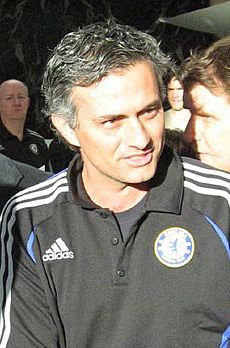
However, there were growing rumors of disagreements between Mourinho and Chelsea owner Roman Abramovich. On 20 September 2007, Mourinho unexpectedly left Chelsea by "mutual consent." He left as the most successful manager in Chelsea's history, having won six trophies in three years. He was also undefeated in all home league games during his time there.
Inter Milan: The Historic Treble
On 2 June 2008, Mourinho became the new manager of Inter Milan in Italy. He learned Italian in just three weeks. In his first season, he won the Italian Super Cup and the Serie A title.
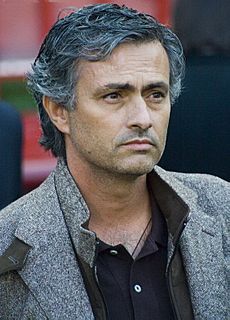
In his second season, 2009–10, Mourinho achieved something truly special. Inter Milan won a "continental treble": the Serie A title, the Coppa Italia, and the UEFA Champions League. This was the first time an Italian club had ever won all three major trophies in one season. This made Mourinho the first manager to win a treble with an Italian club.
Inter's Champions League journey was memorable. They beat his former club Chelsea and then defeated Barcelona in the semi-finals. Mourinho called the 1–0 loss to Barcelona in the second leg "the most beautiful defeat of my life" because it secured their place in the final. Inter then beat Bayern Munich 2–0 in the final to win the Champions League.
The day after winning the Champions League, Mourinho hinted he would leave Inter. He said that if you don't coach Real Madrid, "then you will always have a gap in your career."
Real Madrid: Breaking Records in Spain
On 31 May 2010, Mourinho was announced as the new manager of Real Madrid in Spain. He signed a four-year contract. Real Madrid had not been performing as well as expected, despite having star players like Kaká and Cristiano Ronaldo.
First Season and Copa del Rey Win
Mourinho's first La Liga game with Real Madrid was a 0–0 draw. However, his team quickly started winning big, with victories like 6–1 and 4–1. On 29 November 2010, Real Madrid lost 5–0 to their rivals Barcelona in Mourinho's first El Clásico match.
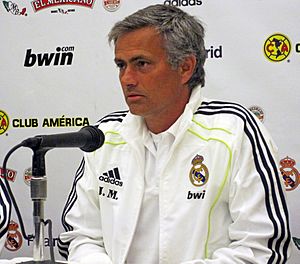
On 20 April 2011, Mourinho won his first trophy in Spanish football. Real Madrid defeated Barcelona 1–0 in the Copa del Rey final. This ended Real Madrid's 18-year wait for the Copa del Rey trophy. Real Madrid also reached the Champions League semi-finals, their best performance in the tournament in many years.
Record-Breaking La Liga Title
In the 2011–12 season, Real Madrid had an amazing year. On 21 April 2012, they beat Barcelona 2–1 in El Clásico at Camp Nou, which gave them a big lead in the league. Real Madrid won the La Liga title for the first time in four years. They broke several records, including most games won (32), most points (100), and most goals scored (121) in a La Liga season. They finished nine points ahead of Barcelona.
Final Season and Departure from Madrid
On 22 May 2012, Mourinho signed a new contract to stay at Real Madrid until 2016. He won the Spanish Super Cup in August 2012, meaning he had won every domestic title available in Spain within two years. He became the only coach to win national super cups in four different European countries.
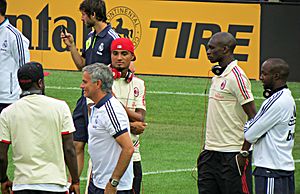
Real Madrid reached the Champions League semi-finals for the third year in a row under Mourinho. However, they were defeated by Borussia Dortmund. Mourinho's relationships with some players and the media became difficult. On 20 May 2013, Real Madrid announced that Mourinho would leave the club by "mutual agreement."
Return to Chelsea
On 3 June 2013, Chelsea appointed Mourinho as manager for the second time. He told Chelsea TV, "In my career I've had two great passions – Inter and Chelsea – and Chelsea is more than important for me."
Third Premier League Title
Mourinho's first game back at Chelsea was a 2–0 home win. In March 2014, he received a special share number from the Chelsea Pitch Owners Association for his contributions to the club.
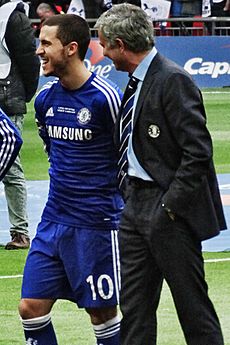
On 19 April 2014, Mourinho suffered his first-ever home league defeat as Chelsea manager. Chelsea finished third in the 2013–14 Premier League.
The 2014–15 season started well for Chelsea. On 1 March 2015, Chelsea defeated Tottenham Hotspur 2–0 in the League Cup final. This was their first trophy of the season and Mourinho's first since returning to Chelsea.
On 3 May 2015, Chelsea were crowned Premier League champions with three games left to play. Mourinho was named Premier League Manager of the Season.
Second Departure from Chelsea
On 7 August 2015, Mourinho signed a new four-year contract with Chelsea. However, the season started poorly. Chelsea lost nine of their first 16 Premier League matches. On 17 December 2015, Chelsea announced that they had parted ways with Mourinho "by mutual consent." He left as a "much-loved, respected and significant figure at Chelsea."
Manchester United
On 27 May 2016, Mourinho signed a three-year contract with Manchester United. On 7 August 2016, he won his first trophy with the club, the FA Community Shield. He also won his first Premier League game as United boss.
On 26 October 2016, Mourinho won his second Manchester derby against Pep Guardiola's Manchester City in the EFL Cup. On 29 January 2017, United reached the EFL Cup final. They won the final 3–2 against Southampton, making Mourinho the first United manager to win a major trophy in his first season.
On 24 May 2017, Manchester United won the Europa League by beating Ajax 2–0. This was Mourinho's second major trophy in his first season at United. It also meant he had won every major European Cup final he had managed.
Premier League and FA Cup Runner-up
In the summer of 2017, Mourinho signed new players like Romelu Lukaku and Nemanja Matić. Manchester United started the season strongly. However, they were knocked out of the Champions League by Sevilla in the last-sixteen stage. Manchester United finished second in the Premier League, their best result since Alex Ferguson left. They also lost the 2018 FA Cup Final to Chelsea.
Final Season in Manchester
The 2018–19 season started poorly for Manchester United. After a heavy home defeat to Tottenham Hotspur, Mourinho demanded "respect" from journalists. He held up three fingers, showing how many Premier League titles he had won.
After winning only seven of their first 17 Premier League games, Mourinho was sacked by Manchester United on 18 December 2018.
Tottenham Hotspur
On 20 November 2019, Mourinho was appointed manager of Tottenham Hotspur.
First Season with Tottenham
On 23 November 2019, Mourinho managed his first match with Tottenham, a 3–2 away win. He later praised a ball boy for helping with a goal in a Champions League game. Tottenham lost to RB Leipzig in the Champions League round of 16.
Mourinho recorded his 300th win in English football in June 2020. Tottenham finished sixth in the Premier League in his first season.
Cup Final and Dismissal
On 4 October 2020, Mourinho led Tottenham to a big 6–1 win against his former club Manchester United. A 2–0 victory over Arsenal in December put Tottenham at the top of the Premier League.
On 10 February 2021, Tottenham were knocked out of the FA Cup. On 18 March, they were eliminated from the Europa League.
On 19 April 2021, Mourinho was sacked by Tottenham Hotspur after 17 months. This was the first time Mourinho had left a club without winning a trophy since 2002.
Roma
"Some time ago you just had the fitness coach. Now you have the performance coach, the recovery coach, the individual coach, and you have the prevention coach. It is crazy. It has brought our work to an incredible dimension. You have to deal with so many people with so different characters and egos now. You also need to cope with much more information than before. Sometimes I have to select the most important information because we simply can't deal with everything."
On 4 May 2021, Mourinho was appointed head coach of Roma in Italy.
Ending Roma's Trophy Drought
In his first summer at Roma, Mourinho brought in important players like Tammy Abraham. He also used young players from the academy. On 19 August 2021, Mourinho managed his first match with Roma, a 2–1 away win. Three days later, he returned to Serie A with a 3–1 home victory.
Mourinho reached 1,000 games as a manager on 12 September 2021. On 21 October, Roma suffered a big 6–1 defeat in a Conference League game. Mourinho said the team did not have a "very good squad."
On 5 May, Mourinho led Roma to their first European final since 1991. They beat Leicester City in the semi-finals of the Europa Conference League. This made him the first manager to reach the final of all three current major European competitions.
On 24 May, Mourinho won his first title with Roma by defeating Feyenoord in the Europa Conference League Final. This was Roma's first trophy in 11 years. It also made him the third manager to have won all three existing major European trophies. He was the first to achieve the UEFA treble by winning the Champions League, Europa League, and Europa Conference League.
Back-to-Back European Finals
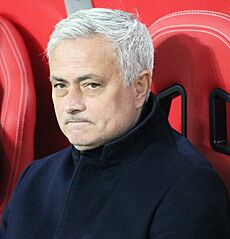
For the 2022–23 season, Roma signed players like Paulo Dybala on a free transfer. The club started the league season with a win. On 4 September, Roma lost 4–0 to Udinese, which was Mourinho's biggest defeat in Serie A. He said he "preferred losing one match 4–0 than four matches 1–0."
On 18 May, Mourinho guided Roma to their second consecutive European final. They beat Bayer Leverkusen in the semi-finals of the Europa League. This repeated his achievement with Porto of reaching back-to-back European finals.
In the Europa League final on 31 May, Roma faced Sevilla. They lost 4–2 on penalties after a 1–1 draw. This was Mourinho's first loss in a European final. After the match, he gave his runner-up medal to a young Roma supporter.
Struggles and Departure
In his third season, Roma signed players like Romelu Lukaku on loan. On 17 September, Roma had a huge 7–0 win against Empoli.
However, the team had a difficult period, losing several games. On 16 January 2024, Roma announced that they had parted ways with Mourinho.
Fenerbahçe: New Chapter in Turkey
On 1 June 2024, Turkish club Fenerbahçe confirmed they were talking with Mourinho about becoming their head coach. The next day, he was officially introduced as the club's new manager. He was presented to the fans at the Şükrü Saracoğlu Stadium. In a Europa League game, he protested a referee's decision and received a red card.
Manager Profile
Tactics and Game Style
Mourinho is known for his smart tactics and ability to adapt to different game situations. His teams are usually very good at defending and quickly moving the ball forward through the midfield. He often uses three or more central midfielders, believing that controlling the midfield is key to winning games.
When he managed Porto, Mourinho used a 4–4–2 formation with a diamond midfield. This gave Porto an advantage in the middle of the field. His teams also played with a high defensive line and pressed opponents high up the pitch.
At Chelsea, Mourinho used a 4–3–3 formation. This helped Chelsea win Premier League titles in 2005 and 2006. He explained that having a defensive midfielder and two others in front created an "extra man" in midfield.
At Inter Milan, he switched between a 4–3–3 and a diamond formation. In his second season, he used a 4–2–3–1 formation, which helped Inter win the treble. This formation allowed for quick counter-attacks.
As Real Madrid manager, Mourinho used a flexible 4–2–3–1 formation. This allowed for very fast counter-attacks. Real Madrid broke many records in the 2011–12 season, including 100 points and 121 goals scored.
Mourinho is also praised for how quickly he reacts during games. He is known for always being well-prepared about his opponents and outsmarting other managers. He pays close attention to details and communicates well with his team during matches.
How People See Him
Since he called himself "The Special One" in 2004, Mourinho has often been known by that nickname. Many players and coaches consider him one of the best managers of his time, and one of the greatest ever. In 2010, Pep Guardiola called Mourinho "probably the best coach in the world."
Players who have worked with Mourinho often praise his ability to motivate them. Wesley Sneijder said he would "kill and die" for Mourinho. Samuel Eto'o described him as a "unique" coach who understood every player. Frank Lampard said Mourinho is the best manager he has ever worked for.
However, some people have criticized Mourinho's tactics. They sometimes say he plays defensive, "dull" football just to get results. In 2011, Johan Cruyff said, "Mourinho is a negative coach. He only cares about the result and doesn't care much for good football."
Media and Public Life
Mourinho has become famous outside of football. He has appeared in advertisements for companies like Samsung and Adidas. An unofficial book about him, O Vencedor – De Setúbal a Stamford Bridge (The Winner – from Setúbal to Stamford Bridge), was a bestseller in Portugal.
In May 2007, Mourinho was briefly arrested for trying to stop animal welfare officials from taking his dog into quarantine. The situation was resolved, and his dog was returned to Portugal.
Mourinho is a Roman Catholic. He has said, "Every day I pray; every day I speak with Him." He believes his relationship with God is more important than football. Besides his native Portuguese, Mourinho speaks Spanish, Italian, French, Catalan, and English.
In 2009, Mourinho received an honorary doctorate degree from the Technical University of Lisbon for his achievements in football. In 2011, he was named "Rockstar of the Year" by the Spanish Rolling Stone magazine.
In 2018, Mourinho worked as an analyst for the 2018 FIFA World Cup. In 2019, he started hosting a show called On the Touchline with José Mourinho. He also joined Sky Sports as a football pundit.
In October 2022, Mourinho's famous phrase "park the bus" was added to the Oxford English Dictionary. He used this phrase in 2004 to describe a team's very defensive tactics.
Personal Life
Mourinho met his wife, Matilde "Tami" Faria, when they were teenagers in Portugal. They married in 1989. They have two children: a daughter named Matilde (born 1996) and a son named José Mário Jr (born 2000). Mourinho says his family is the most important thing in his life.
He has also been involved in charity work. He helped a youth project that brought Israeli and Palestinian children together through football. He also donated his lucky jacket to help with Tsunami Relief. Since 2014, he has been a Global Ambassador for the United Nations' World Food Programme.
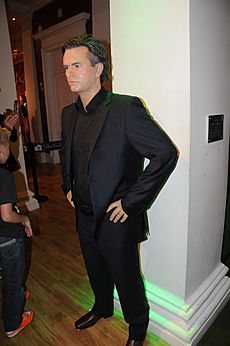
Managerial Statistics
| Team | From | To | Record | Ref. | |||||||
|---|---|---|---|---|---|---|---|---|---|---|---|
| P | W | D | L | GF | GA | GD | Win % | ||||
| Benfica | 20 September 2000 | 5 December 2000 | 11 | 6 | 3 | 2 | 17 | 9 | +8 | 54.55 | |
| União de Leiria | 1 July 2001 | 23 January 2002 | 23 | 12 | 8 | 3 | 34 | 20 | +14 | 52.17 | |
| Porto | 23 January 2002 | 2 June 2004 | 127 | 91 | 21 | 15 | 254 | 96 | +158 | 71.65 | |
| Chelsea | 2 June 2004 | 20 September 2007 | 185 | 124 | 40 | 21 | 330 | 119 | +211 | 67.03 | |
| Inter Milan | 2 June 2008 | 28 May 2010 | 108 | 67 | 26 | 15 | 185 | 94 | +91 | 62.04 | |
| Real Madrid | 31 May 2010 | 1 June 2013 | 178 | 128 | 28 | 22 | 475 | 168 | +307 | 71.91 | |
| Chelsea | 3 June 2013 | 17 December 2015 | 136 | 80 | 29 | 27 | 245 | 121 | +124 | 58.82 | |
| Manchester United | 27 May 2016 | 18 December 2018 | 144 | 84 | 32 | 28 | 244 | 121 | +123 | 58.33 | |
| Tottenham Hotspur | 20 November 2019 | 19 April 2021 | 86 | 44 | 19 | 23 | 166 | 103 | +63 | 51.16 | |
| Roma | 1 July 2021 | 16 January 2024 | 138 | 68 | 31 | 39 | 213 | 143 | +70 | 49.28 | |
| Fenerbahçe | 2 June 2024 | present | 56 | 35 | 12 | 9 | 128 | 65 | +63 | 62.50 | |
| Total | 1,189 | 736 | 248 | 205 | 2,291 | 1,059 | +1232 | 61.90 | |||
Honours and Achievements
As Assistant Manager
Porto
- Primeira Divisão: 1994–95, 1995–96
- Taça de Portugal: 1993–94
- Supertaça Cândido de Oliveira: 1994
Barcelona
- La Liga: 1997–98, 1998–99
- Copa del Rey: 1996–97, 1997–98
- Supercopa de España: 1996
- European Cup Winners' Cup: 1996–97
- UEFA Super Cup: 1997
As Manager
Porto
- Primeira Liga: 2002–03, 2003–04
- Taça de Portugal: 2002–03
- Supertaça Cândido de Oliveira: 2003
- UEFA Champions League: 2003–04
- UEFA Cup: 2002–03
Chelsea
- Premier League: 2004–05, 2005–06, 2014–15
- FA Cup: 2006–07
- Football League Cup: 2004–05, 2006–07, 2014–15
- FA Community Shield: 2005
Inter Milan
- Serie A: 2008–09, 2009–10
- Coppa Italia: 2009–10
- Supercoppa Italiana: 2008
- UEFA Champions League: 2009–10
Real Madrid
- La Liga: 2011–12
- Copa del Rey: 2010–11
- Supercopa de España: 2012
Manchester United
- EFL Cup: 2016–17
- FA Community Shield: 2016
- UEFA Europa League: 2016–17
Roma
- UEFA Europa Conference League: 2021–22
Individual Awards
- Onze d'Or Coach of the Year: 2005
- FIFA World Coach of the Year: 2010
- IFFHS World's Best Club Coach: 2004, 2005, 2010, 2012
- IFFHS World's Best Coach of the 21st Century 2001–2020
- Premier League Manager of the Season: 2004–05, 2005–06, 2014–15
- Premier League Manager of the Month: November 2004, January 2005, March 2007, November 2020
- Serie A Coach of the Year: 2008–09, 2009–10
- Serie A Coach of the Month: August 2022
- Panchina d'Oro: 2009–10
- Miguel Muñoz Trophy: 2010–11, 2011–12
- UEFA Manager of the Year: 2002–03, 2003–04
- UEFA Team of the Year: 2003, 2004, 2005, 2010
- World Soccer Magazine World Manager of the Year: 2004, 2005, 2010
- World Soccer 3rd Greatest Manager of All Time: 2013
- ESPN 9th Greatest Manager of All time: 2013
- France Football 13th Greatest Manager of All time: 2019
- BBC Sports Personality of the Year Coach Award: 2005
- La Gazzetta dello Sport Man of the Year: 2010
- International Sports Press Association Best Manager in the World: 2010
- Globe Soccer Awards Best Coach of the Year: 2012
- Globe Soccer Awards Best Media Attraction in Football: 2012
- Portuguese Coach of the Century: 2015
- PFA Portuguese Manager of the Year: 2017
- Italian Football Hall of Fame: 2022
Other Recognitions
- Grand Officer of the Order of Prince Henry (a Portuguese honor)
- Doctor Honoris causa – an honorary doctorate from Lisbon Technical University
Records Set
Guinness World Records
- Former record holder for most points in a Premier League season (95 points)
- Youngest manager to reach 100 Champions League games (49 years, 12 days)
- Most games unbeaten at home in the Premier League (77)
- Fewest goals conceded in a Premier League season (15 goals)
- Longest football unbeaten home run by a manager (9 years)
Other Records
- Most Champions League titles with different clubs (two)
See also
 In Spanish: José Mourinho para niños
In Spanish: José Mourinho para niños
- "José and his Amazing Technicolor Overcoat"
- Special 1 TV
- José Arrogantio, a character based on Mourinho in comedy series Harry and Paul
 | James B. Knighten |
 | Azellia White |
 | Willa Brown |



